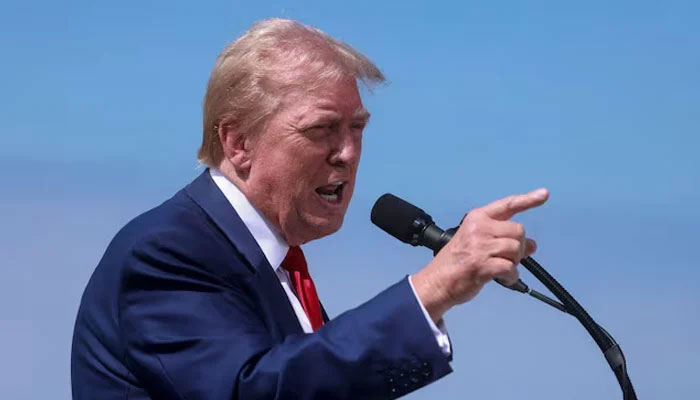Trump’s controversial appointments: shocking choices spark bipartisan reactions
NEW YORK: President-elect Donald Trump, buovyed by his decisive electoral victory, is making appointments to key positions.
Trump, buoyed by his decisive electoral victory, is making in ways that have not only unsettled his Republican Party but also energised his defeated political opponents, the Democrats. Despite losing control of the Senate and the House of Representatives, Democrats appear prepared to mount significant resistance against Trump’s controversial choices.
While Trump has silenced or sidelined the traditional conservative leadership of the Republican Party, consolidating his grip and rebranding “Republican” ideology as “Trumpism,” his recent appointments have drawn criticism even from within his own Republican party. The president-elect’s strategy of ignoring experience and balance in favour of personal loyalty has left some Republicans uneasy. Among the critics are, Louisiana Senator (R) Bill Cassidy, Maine Senator (R) Susan Collins, and Alaska Senator(R) Lisa Murkowski, who have openly expressed their concerns.
Others within the Republican ranks remain silent but visibly apprehensive about the implications of these appointments.
With only a four-seat majority in the Senate and a slim margin in the House of Representatives, Trump’s Republican Party faces a precarious position.
Meanwhile, the Democrats, seeking to recover from their electoral defeat, are readying themselves to oppose these nominations vigorously. The mainstream American media, known for its liberal leanings and critical stance on Trump, has also started raising doubts about these choices, citing their potential implications for democracy and governance.
One of the most controversial nominations is that of Republican Congressman Matt Gaetz as Attorney General. Gaetz, who has faced allegations of misconduct and was under investigation by a House committee, resigned from Congress shortly after his nomination, reportedly to avoid the release of an investigative report.
Known for his combative style, Gaetz has fiercely attacked other Republican leaders while staunchly defending Trump, making his appointment a lightning rod for criticism.
Trump has also nominated Tulsi Gabbard, a former Democratic Congresswoman from Hawaii who recently switched allegiance to the Republican Party, to head the National Intelligence agencies. Gabbard’s past criticism of Republican leadership and her alleged ties to Russian interests have raised eyebrows within both parties. Some Republicans have even accused her of being a “Russian agent,” further fueling the controversy around her nomination.
For Secretary of Defence, Trump has tapped Fox News anchor Pete Hegseth, a former National Guard serviceman with no experience in global military strategy or defense management. His primary qualification appears to be his unwavering support for Trump.
He lashed back and even accused some Republicans in persuasion of his loyality to Donald Trump.
Another surprising pick is Robert F. Kennedy Jr., a well-known Democrat and a member of the prominent Kennedy family. He has been a close friend and supportive of late Murtaza Bhutto, during Ziaul Haque’s rule in Pakistan. He wrote an article opposing death sentence of Shaheed Zulfiqar Ali Bhutto that infuriated Zialu Haque.
Robert Kennedy Junior, a Democrat turned supportive of Trump has been nominated as Secretary of Health. Kennedy, an outspoken critic of vaccines, has been entrusted with leading the nation’s healthcare—a decision that has sparked widespread debate in the media and among health professionals.
-
 Maria Shriver Shares Heartbreaking Reminder After Eric Dane's Death: 'Next Week Isn't Guaranteed'
Maria Shriver Shares Heartbreaking Reminder After Eric Dane's Death: 'Next Week Isn't Guaranteed' -
 Andrew Mountbatten Windsor Gets New Moniker After Losing ‘Prince’ Title
Andrew Mountbatten Windsor Gets New Moniker After Losing ‘Prince’ Title -
 Jack Black Shares Unseen Moments With Tanya Haden: 'My Love'
Jack Black Shares Unseen Moments With Tanya Haden: 'My Love' -
 Shamed Andrew Made Taxpayers Fund Personal ‘massages’
Shamed Andrew Made Taxpayers Fund Personal ‘massages’ -
 What Could Be Nick Reiner's Fate After Pleading Not Guilty Parents’ Murder Case?
What Could Be Nick Reiner's Fate After Pleading Not Guilty Parents’ Murder Case? -
 Princess Kate Talks About 'hard Conversations' With Kids Amid Andrew Drama
Princess Kate Talks About 'hard Conversations' With Kids Amid Andrew Drama -
 Prince William Mocked For Being ‘most Reluctant’ King-in-waiting
Prince William Mocked For Being ‘most Reluctant’ King-in-waiting -
 Prince William Makes Rare Admission After Andrew Arrest
Prince William Makes Rare Admission After Andrew Arrest -
 ‘Got A Lot Of People Gunning For Me’: Trump Makes First Comments On Mar-a-Lago Intruder
‘Got A Lot Of People Gunning For Me’: Trump Makes First Comments On Mar-a-Lago Intruder -
 What Countries Have A Say In Andrew Removal From Line Of Succession?
What Countries Have A Say In Andrew Removal From Line Of Succession? -
 How Did Luci4 Die? Police Probes 'BodyPartz' Sudden 'suspicious' Death
How Did Luci4 Die? Police Probes 'BodyPartz' Sudden 'suspicious' Death -
 King Charles Criticized By Princess Anne Over Andrew Drama
King Charles Criticized By Princess Anne Over Andrew Drama -
 Hailee Steinfeld Details Preparations Ahead Of Welcoming First Kid With Josh Allen
Hailee Steinfeld Details Preparations Ahead Of Welcoming First Kid With Josh Allen -
 Shocking Details Revealed About Gunman 'Austin Tucker' Shot Dead At Trump’s Resort 'Mar-a-Lago'
Shocking Details Revealed About Gunman 'Austin Tucker' Shot Dead At Trump’s Resort 'Mar-a-Lago' -
 Queen Camilla Meets Gisèle Pelicot, Sends Powerful Message To Victims As Andrew's Scandal Deepens
Queen Camilla Meets Gisèle Pelicot, Sends Powerful Message To Victims As Andrew's Scandal Deepens -
 Cancer-stricken King Charles At Breaking Point?
Cancer-stricken King Charles At Breaking Point?




